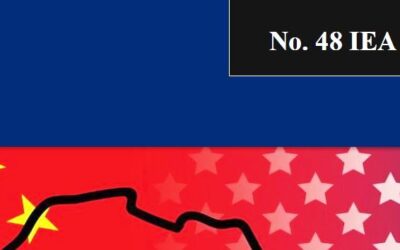September 9, 2021
IEA Dialogue Centre
It will be recalled that during the inauguration of the new Bank of Ghana (BoG) Board on August 20, the President expressed concern about high lending rates in the country, highlighting the negative impact especially on growth. The President called out the Board to address the problem as a matter of urgency. The Governor, on his part, pledged the Board’s commitment to take the necessary steps to fulfil the President’s call.
In a proactive response to this, the IEA organised a forum which provided a platform for key stakeholders, including representatives from government, the Central Bank and commercial banks, as well as bank customers, CSOs and the media to discuss the issue dispassionately and arrive at concrete solutions for the attention of the relevant parties.
At the forum, IEA’s Director of Research, Dr. John K. Kwakye, tabled the Institute’s views on the issue—which has been a long-standing interest of the institute and has conducted extensive research on.
Presentation by Dr. John Kwakye
In his presentation, Dr. Kwakye first gave the historical antecedents behind interest rates in Ghana. He then explained a trend analysis of the various interest rates in Ghana’s financial space, their relationships as well as the spreads between them. In all, he noted that the levels and spreads among the rates were telling the same story, viz that the lending rate is out of place hence, the anomaly needed to be fixed.
According to the director, from the evidence available to us, the causes of high lending rates are multifaceted. It cannot pin it down to just one cause—or even two. He further stated that the causes may be placed at the doorsteps of three key actors in the economy: banks, government and the monetary and regulatory authority. In this regard, he laid down some of the causes and recommendations:
The Role of Banks
Banks’ contribution to high lending rates emanates from their inefficiencies, high operating costs, and poor appraisal of projects, collusive practices and “customer capture.”
Government
Government responsibility for high lending rates emanates from borrowing from banks to finance the budget, macroeconomic instability associated with high budget deficits, and high and multiple taxes imposed on banks.
Monetary and regulatory authority
The role of the monetary and regulatory authority in high lending rates emanates from the inherently upward bias of monetary policy on interest rates, cost of high and currency-differentiated reserve requirements, and lack of well-functioning Credit Reference Bureaux.
Recommendations for addressing the problem of high lending rates
Dr. Kwakye further stated some recommendations which could help moderate the problem of high lending rates to each of the three stakeholders as follows:
Banks:
1. Address operational inefficiencies by adopting more digitalization measures to reduce costs so that they are not passed on to customers.
2. Reduce operating and overhead expenses. Contain labour costs by keeping the right size of staff and reasonable levels of staff pay; keep material, equipment and rent expenses under control; economise on use of utilities.
3. Strengthen customer project appraisal capacity to reduce incidence of loan defaults and the effect on costs.
Government
1. Restrain borrowing from banks by keeping the budget deficit in check so as to reduce competition for loanable funds and create the necessary stable macroeconomic environment to ease pressure on lending rates.
2. Streamline bank taxes to help reduce their costs. Provide a level playing field in respect of their corporate tax. Phase out the 5% Ghana Fiscal Stabilization Levy that has been in place since 2001 and whose introduction was hard to justify and has outlived its usefulness, if any.
3. Together with the monetary and regulatory authority, promote and support parallel or specialised financial institutions such as rural banks, the newly-established National Development Bank, etc. to offer funding especially to SMEs and strategic sectors of the economy, such as agriculture, industry and housing, in order to reduce the demand for loans from the traditional banks and help ease pressure on lending rates.
Monetary and Regulatory Authority
1. Ensure that the fight against inflation does not itself fuel high lending rates. This requires a broader approach to fighting inflation, including by paying attention to the supply-side causes, as overly emphasis on demand management tends to weigh on interest rates.
2. Reduce the primary reserve ratio from the current level of 8% to 5% to reduce the associated cost to banks. Further, allow banks to cover their dollar deposits with dollar reserves to avoid their exposure to exchange risk and its passage on to lending rates.
3. Ensure that the Deposit Insurance Scheme works effectively so as to make a high primary reserve requirement for prudential purposes unnecessary.
4. Ensure that Credit Reference Bureaux operate effectively to help reduce borrower risks, incidence of loan defaults and lending rates.
5. Keep bank customers continually informed about interest rates and other charges and fees in the banking sector so that they can make informed decisions in accessing financial services.
6. Regulate the lending rate-Policy Rate spread.
7. Regulate other financial charges and fees, including those levied in respect of related to loans, use of credit cards, use of ATMs and foreign exchange transactions.
8.Together with government, create and support parallel or specialised financial institutions such as rural banks, the newly-established National Development Bank, etc. to offer affordable funding especially to SMEs and strategic sectors of the economy such as agriculture, industry and housing, in order to reduce the demand for loans from the traditional banks and pressure on lending rates
Following the presentation, Mr. Solomon Tettey-Akeng of the Chartered Institute of Bankers, initiated the discussion by rejecting the spread-capping proposal, arguing that it was counterproductive. He further noted that high lending rates are not the responsibility of banks but the economic conditions of the country. Participants present at the programme cut cross the entire financial sector with representatives from the Ministry of Finance, the Chartered Institute of Bankers, Bank of Ghana, Ghana Investment Promotion Centre, Ghana Chamber of Commerce, University of Ghana, Trade Union Congress, University of Education as well as some commercial banks. Notable dignitaries present were: Mr. John Awuah Deputy CEO, Ghana Association of Bankers; BoG’s Monetary Committee member, Mr. Zakari Mumuni; Dr. Ikililu Mohammed, Economist at the Consolidated Bank of Ghana.





0 Comments